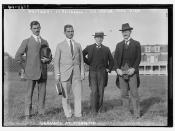1.a) The policies of the Second Reich during the war initiated economical problems within Germany that later led to hyperinflation. To cover the cost of the war the German government relied heavily upon borrowing and printing money. It did this in anticipation of winning the war and claiming compensation from the defeated countries. It built up huge debts as the money they were printing quickly became greater than the value of their assets, which deemed it worthless. When Germany lost the war this debt increased as it was now faced with unexpected reparations. The government avoided the alternative option they could have taken which was to raise taxes for two reasons. Firstly it would have been extremely unpopular and it needed to make every attempt not to lose support from the people. Secondly it was not expecting defeat so taxes would have been an unnecessary risk from their point of view at that time.
b) The Weimar governments exacerbated the problem in economy that had been created by the Second Reich as they maintained similar policies after the war. Following its predecessor the new government printed more money and failed to raise taxes. It too needed support from the people, even more so than the previous government as the people were extremely disillusioned and exhausted after defeat in the First World War. And subsequently chose not to raise taxes as a means of paying off some of its debts and other costs such as post-war pensions, wages for civil servants, welfare benefits and subsidies as well as the additional burden of reparations. By 1923 300 paper mills and 2000 printing firms were working 24-hour shifts to produce money. Whilst their decision may have seemed beneficial in the short term by increasing the amount of money in the economy thus maintaining...


![[German vehicle tax registration issued to George Grantham Bain] (LOC)](https://s.writework.com/uploads/6/60390/german-vehicle-tax-registration-issued-george-grantham-bain-thumb.jpg)